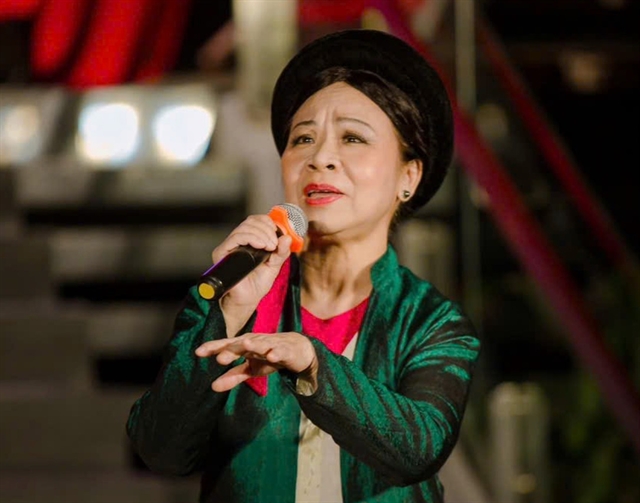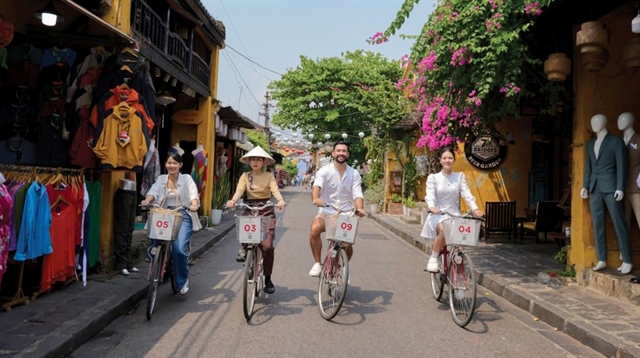 Inner Sanctum
Inner Sanctum

The HCM City Ballet Symphony Orchestra and Opera (HBSO), established more than 20 years ago, provides quality chamber and vocal concerts and dance performances for local and foreign audiences in HCM City. Meritorious Artist Trần Vương Thạch, HBSO’s director, speaks with Phương Mai about the theatre’s achievements and challenges ahead.
7102658AM.jpg) |
| HBSO director Trần Vương Thạch |
The HCM City Ballet Symphony Orchestra and Opera (HBSO), established more than 20 years ago, provides quality chamber and vocal concerts and dance performances for local and foreign audiences in HCM City. The shows often feature classical works by both Vietnamese and international composers, and are performed by foreign and local artists. Meritorious Artist Trần Vương Thạch, HBSO’s director, speaks with Phương Mai about the theatre’s achievements and challenges ahead.
Inner Sanctum: What are HBSO’s most significant achievements of the last 20 years?
HBSO was established in 1993 with only 13 artists and workers, and now we have 133 officials and dozens of collaborators. We have three troupes, including the orchestra, ballet and opera.
The orchestra, which was established first, has received support from local and international artists. The troupe was invited to perform at the Asian Orchestra Week in Tokyo in 2008 and in 2014.
The ballet started with excerpts from famous foreign and Vietnamese ballets, including Carmen, Gisele and Ngọc Trai Đỏ (Red Pearl). However, since 2011, the troupe has presented full versions of the classical ballets Nutcracker and Cinderella.
We have also introduced contemporary dance works choreographed by HBSO artists Nguyễn Phúc Hải and Nguyễn Phúc Hùng, including Những Mảnh Ghép Của Những Giấc Mơ (Dream Puzzles) and Chạm Tay Vào Quá Khứ (Touching the Past).
In 2012, the Opera presented the full version of Henry Purcell’s opera Dido and Aeneas which was staged and led by conductor Norwegian Lars Notto Birkeland.
Since then, the troupe has introduced a series of opera masterpieces, including Mozart’s Magic Flute, Bizet’s Carmen and Offenbach’s La Vie Parisienne (Parisian Life).
After many years, for the first time, in 2009, HBSO published a brochure offering detailed information on programmes for the year. We increased the number of performances from two shows a month during the 2005-2010 period to three shows a month beginning in 2011.
We’re very happy to say that most of our shows sell out. We feel lucky that we have received support from international and local individuals and organisations. Thanks to them, our artists have improved a lot and we have received attention for the quality of our performances.
This year, we welcomed conductors Daniel Gazon of Belgium and Stefano Meceli of Italy, British-Vietnamese pianist Bích Trà, Vietnamese-French violinist Stephane Trần, and many artists from Germany, France, Russia, South Korea, and Japan.
HBSO has received huge support from international artists and organisations. Can you talk more about the cooperation?
We are proud to say that HBSO’s fame is known around the world.
Many international artists have contacted us through consulates, and via email and HBSO’s Facebook page, to ask for cooperation. They haven’t asked for any payment.
We have cooperated with different countries’ cultural centres in Việt Nam, as well as organisations in Norway, Russia, South Korea and Japan.
We have received a request from a Japanese organisation to send three musicians to HBSO to perform in a chamber concert in late May. Happily, they asked us not to pay for the musicians as they will be responsible for all the fees.
We have worked with the General Consulate of France in HCM City to organise a concert Ngày Châu Âu (European Day) on May 9.
In 2019, we will collaborate with the Goethe Institute of Germany to host a special programme, combining Goethe’s dance festival “Europe meets Asia in Contemporary Dance” and our biennial festival Giai Điệu Mùa Thu (Autumn Melody).
Can you tell us about HBSO’s schedule in 2017?
This year, HBSO will present concerts featuring classical masterpieces by great foreign composers and works by Vietnamese composers.
We will introduce a new contemporary dance Ru Đêm (Night Lullaby) choreographed by three of HBSO’s talented artists, Nguyễn Phúc Hải, Nguyễn Phúc Hùng, and Sùng A Lùng, with my original music.
We will continue to restage our sold-out performances, including the ballets Cinderella and Nutcracker, and the contemporary dance Chạm Tay Vào Quá Khứ.
This year, the HBSO’s most awaited programme, the Giai Điệu Mùa Thu festival, will be back in August.
What is the Giai Điệu Mùa Thu festival?
The festival will be held from August 17-29 with 11 performances. There will be more than 160 Vietnamese artists and 42 international musicians.
From HCM City, we have HBSO artists, the HCM City Conservatory of Music’s brass band, the Saigon Guitar Quartet, and young pianist Nguyễn Lan Anh.
Guest performers from Hà Nội will include violinist Bùi Công Duy, cellist Trần Thị Mơ, young violinist Trần Lê Quang Tiến and 10 excellent students from the Việt Nam National Academy of Music.
We’re also happy to welcome 12 young talents from the Spivakov Foundation from Russia, the Sakura String Orchestra Kitakyushu from Japan, the International Ensemble from the US, and soloists from Russia, Germany, Canada and Macedonia.
Our programme for the festival includes the premiere in Viet Nam of the famous operetta Die Fledermaus (The Bat) by Johann Strauss II. It will be staged and directed by experts from Germany.
We are proud to introduce a new version of the famous ballet Carmen, which will be staged by choreographers Hải and Hùng. The performance is expected to be more seductive, alluring and impressive.
For more than 20 years, HBSO has not had a permanent home. You rent the HCM City Opera House as your performing venue and office. Although the city government has planned to build a new theatre for years, the project still has not begun. Can you tell us more about this?
It’s necessary to build a new theatre. As you see, the Opera House is small and has old equipment. It can’t meet the standards of rehearsal and classical music performances.
HBSO rents two venues for rehearsal. One is at the Thanh Vân Theatre at 360A Cách Mạng Tháng Tám Street in District 3 for the opera and the orchestra. The other is at 181 Trần Quốc Thảo Street in District 5 for the ballet.
If we have a new theatre, we can produce higher quality performances and attract more international artists and arts troupes. So, the city residents will have a chance to enjoy the best shows and learn more about classical music.
A new theatre could be a performing venue for all kinds of arts, including cải lương (reformed opera) and hát bội (classical drama).
In a meeting with the city government and the Department of Construction in January, I heard that a new theatre would be built in District 2. The deputy chairwoman of the city People’s Committee, Nguyễn Thị Thu, promised funding of VNĐ1.43 trillion (US$63.5 million) to build the new theatre.
I hope that construction on the new theatre will start by the time I retire in 2021. VNS




